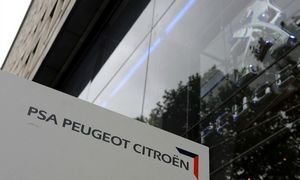PSA Promises New Profit Plan As Restructuring Is Complete

Recurring operating income last year climbed to 2.73 billion euros ($3 billion) from 797 million euros a year earlier, Europe’s second-biggest carmaker said in a statement today. Revenue rose 6 percent to 54.7 billion euros.
The company posted a full-year net profit of 1.2 billion euros, reversing a 555 million loss in 2014.
PSA said its group operational cash flow had reached 3.8 billion euros, beating a 2 billion target for 2015-17, on the back of improved demand in Europe where the market saw car sales rise 9.2 percent last year.
The result “puts our company back in the race and proves its potential,” CEO Carlos Tavares said in the statement. “We will be able to harness this strength when implementing our new plan for profitable growth.”
Goal exceeded
Automotive operating profit last year was 5 percent of revenue, already far exceeding a 2 percent margin goal for the unit that PSA had set for 2018.
The margin was the highest since 2002, Chief Financial Officer Jean-Baptiste de Chatillon said on a conference call with reporters. The carmaker benefited from paring down its product range to 39 models from 45 cars in 2014, he said.
“We are finalizing our economic reconstruction,” de Chatillon said.
"This is a major beat to expectations," Arndt Ellinghorst, a London-based analyst for Evercore ISI, wrote in a note.
The company said it will issue its growth plan on April 5 and will start paying a dividend in line with the industry from this year’s earnings. The biggest European and U.S. automakers paid, on average, about 28 percent of their profit in dividends last year, according to data compiled by Bloomberg.
Bailed out in 2014 by the French state and China’s Dongfeng Motor Corp., which each bought a 14 percent stake, PSA posted its first profit in three years after shutting a plant, cutting jobs and freezing pay.
Still, the company has yet to prove it can sustain its turnaround amid a slowdown in China, the world’s biggest auto market, and the diesel emissions scandal at Volkwagen. While PSA has denied cheating, more than half its European sales rely on the engine type.
Last year, PSA’s global deliveries rose 1.2 percent to 2.97 million cars and light commercial vehicles, boosted by the Middle East, Africa and Asia as well as its home European market.
The company is betting on further expansion in China. The recent agreement with PSA’s Iranian partner to produce 100,000 vehicles a year in Iran starting in late 2017 is also part of the company’s plan to move from cost-cutting toward growth.
